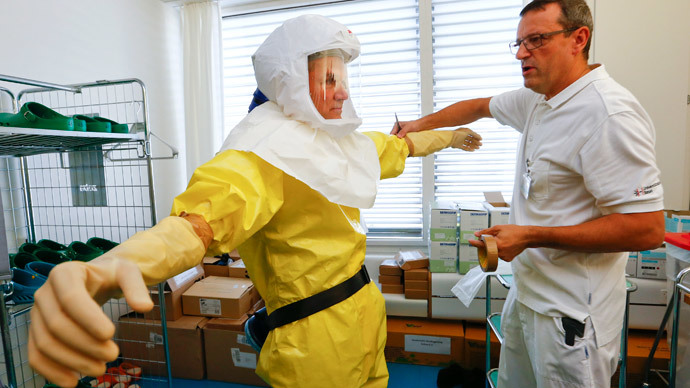‘Up to 50% of victims catch Ebola at funerals’

Containment of the Ebola outbreak requires isolation of infected people while they are receiving treatment, as well as safe and dignified burials, World Health Organization spokeswoman Winifred Romeril told RT.
RT:We have comparative numbers for killer contagious viruses, for example flu's death toll is up to half a million a year and pneumonia kills about 4 million per year. From the start of the Ebola outbreak, it has killed at least 4000 people. So why is Ebola getting this level of concern when other infections are claiming far more lives?
Winifred Romeril: Ebola is scary because it’s so lethal. You don’t infect many people, when one person gets ill, they maybe infect two people. But right now maybe half of those people or higher might die. I think that that’s a reason for concern because it is so virulent.
RT:So meaning almost 100 percent lethality, can we say that Ebola is a real killer?
WR: It is. Certainly you will find people in the countries that have been affected saying that it really gets to the heart of our culture. Like we see in some of these West African nations where people are very affectionate, they hug a lot, they care for the people around them, and you can get Ebola from people who are infected by being in contact with them... When people are sick, people take care about each other, and that’s the time when people are most infectious, when they are already quite ill.
RT:Ebola was discovered in the 1970s, and the world has already seen other Ebola outbreaks. Why wasn’t it stopped when the first cases of infected people were discovered?
WR: It wasn’t diagnosed as soon as other outbreaks mostly because it mimics a lot of other diseases. Ebola has never been seen in this area of Africa before - in West Africa they’ve never dealt with Ebola. When it broke out it was actually in the middle of a time when other diseases were on an upswing – malaria, cholera and other diseases that look like this. So there were tests on someone for cholera, for example, or malaria, that test would come back positive and they thought “oh, this person is so sick because of this disease that we confirmed they have.”

RT:Why is this pandemic spreading more quickly than other diseases?
WR: First of all, as I’m explaining, it got a head start on us. Often, when Ebola shows we find it right away. It’s in communities where we have seen it before, they suspect it immediately and are able to contain it very quickly like we have seen in the case of Senegal and in the case of Nigeria - they were able to contain the cases that they had very quickly. But this time it got a three months head-start on the international community before we realized it was Ebola. So you have, for example, the case of one traditional healer: when that healer died there was a massive funeral gathering, and we can trace back over 350 deaths to that simple funeral, one funeral where people were in contact with the body. So that’s why it got ahead because there was so much change of transmission that escaped and then got to the big cities. We haven’t dealt with that before.
RT:Where could it go? What is next? We see many worrying headlines now, are they overblown?
WR: It depends on which headlines you are looking at. I do think Ebola can be contained. We do know how to contain it. It requires isolation of people who are infected while they are receiving treatment; it requires safe and dignified burials so that more people aren’t infected at these funerals because up to 50 percent of people who catch Ebola catch it at a funeral. We have seen this in the early months of this transmission. So a safe and dignified burial is a really important piece. Of course, isolating people so that more people don’t get this from the people who are already sick, and it can be really contained. The key to that is stepping up the international effort, and we still need more help, we are not there yet.
RT:What are the major pharmaceutical companies doing in terms of finding a cure for Ebola? There is a drug which was found, but is it effective? Do we have it enough to cure everyone?
WR: I believe you are talking about ZMapp but it’s a drug that hasn’t had human trials to determine whether or not it really can work and as you have already said, there is not enough of the drug to really have an impact and treat the people who are ill at this time.
The statements, views and opinions expressed in this column are solely those of the author and do not necessarily represent those of RT.
The statements, views and opinions expressed in this column are solely those of the author and do not necessarily represent those of RT.












